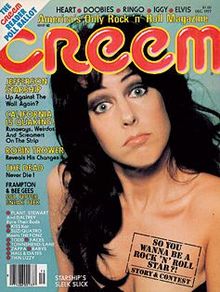- Creem
-
Creem 
December 1977 cover featuring Grace SlickCategories Music magazine Frequency Monthly First issue March 1969 Final issue 1989 Country  United States
United StatesBased in Detroit Language English Website creemmagazine.com Creem (whose trademark is capitalized CREEM - despite the magazine's masthead appearing in lower case letters), "America's Only Rock 'n' Roll Magazine," was a monthly rock 'n' roll publication first published in March 1969 by Barry Kramer and founding editor Tony Reay. It suspended production in 1989 but received a short-lived renaissance in the early 1990s as a glossy tabloid. Lester Bangs, often cited as "America's Greatest Rock Critic," became editor in 1971.[1] The term "punk rock" was said to have been coined by the magazine in 1971, and the term "heavy metal" was also first used in its pages.[2]
Contents
History
Creem was based in Detroit, Michigan, and later the Detroit suburb of Birmingham. This geographical separation from the entertainment industry in the United States, then focused primarily in Hollywood and New York City, along with the British upbringing of original editor Reay, resulted in a certain irreverence, a deprecatory and humorous tone that permeated the magazine throughout its existence. The magazine became famous for its comical photo captions, which poked fun at rock stars, the industry, and even the magazine itself. Its location also meant it was among the first national publications with in-depth coverage of many popular Detroit-area artists, such as Bob Seger, Mitch Ryder, Alice Cooper, The MC5, The Stooges, Iggy Pop, and Parliament-Funkadelic, as well as other Midwestern acts such as Raspberries and Cheap Trick.
Influence
Creem picked up on punk rock (which many claim the magazine, and especially Bangs, helped to conceptualize if not invent) and New Wave movements early on. Creem gave massive exposure to artists like Lou Reed, David Bowie, Roxy Music, Blondie and The New York Dolls years before the mainstream press. In the '80s, it also led the pack on coverage of such upcoming rock icons as R.E.M., The Replacements, The Smiths and The Cure, among numerous others. It was also among the first to sing the praises of metal acts like Motörhead, Kiss, Judas Priest, and Van Halen. Kurt Cobain once stated to RIP Magazine that he had first learned about punk rock from reading Creem as an adolescent.
Staff
Editors and writers for Creem included Lester Bangs, formative early editor Dave Marsh, Billy Altman, John Morthland, Ben Edmonds, Ed Ward, Richard Riegel, Ric Siegel, Robert Christgau, Richard Meltzer, Nick Tosches, Greil Marcus, Jeffrey Morgan, Richard C. Walls, Rob Tyner, Patti Smith, Peter Laughner, Cameron Crowe, Linda Barber, Charlie Auringer, Judy Adams, Jaan Uhelszki, Penny Valentine, Susan Whitall, John "The Mad" Peck, Robot A. Hull, Edward Kelleher (aka, Edouard Dauphin), Rick Johnson, Bruce Malamut, Lotta D. Blooz, John Mendelssohn, Jon Young, Lisa Robinson, Vicki Arkoff, Deborah Frost, Cynthia Rose, Mike Gormley, Sylvie Simmons, Gregg Turner, Chuck Eddy, Mark J. Norton, Dave DiMartino, Alan Niester, Robert Duncan, Bill Holdship and John Kordosh; the latter two edited the last versions of Creem in the late '80s.
The magazine moved its base of operations to Los Angeles shortly before it ceased publication. Holdship and Kordosh were both involved in Creem's move to Los Angeles after it was purchased by Arnold Levitt, but both had already left the magazine before its move to New York City after Levitt licensed the name to a publisher there, and its ultimate demise. Former William Morris agent, musician and journalist Mark J. Petracca (aka Dusty Wright) became the editor during its New York City residence from 1992 - 1993. And Chris Nadler was the last editor before the magazine was shut down. Steve Peters and David Sprague were the last members remaining in the original editorial chain that reached back to 1969.
Graphic design
The CREEM logo was designed by Bob Wilson, who also wrote a regular comic strip, "Mike and Barney". The "Mr. Dreamwhip" and "Boy Howdy" icons were designed by underground cartoonist Robert Crumb, reportedly for $50. Both appeared on the cover of the second issue as a black and white drawing titled Detroit 1969. For the December 1971 issue, Wilson colored the drawing, which appeared in every following issue in a Creem's Profiles, a parody of the then-popular Dewar's Profiles, featuring musicians and bands holding cans of "Boy Howdy" beer.[3]
Dispute
Robert Matheu, a regular Creem photographer since 1977, and his business partners, Ken Kulpa and Jason Turner, who together formed Creem Media, Inc. in 2001, led an online resurrection with a new staff.
Matheu and Brian J. Bowe, original managing editor of the Creem website, compiled an anthology of Creem articles and photographs into a large-format book published by Harper Collins in October 2007. There has been some controversy surrounding the book and its selection of material, although it has received numerous positive reviews.
There is currently a dispute being litigated between J.J. Kramer, New York-based lawyer and son of Creem founder Barry Kramer, and Creem Media, Inc.[4]
Notes and references
- ^ Harrington, Joe S. Sonic Cool: The Life and Death of Rock 'n' Roll. Hal Leonard (2002), p. 226. ISBN 0-634-02861-8.
- ^ allmusic.com - Sir Lord Baltimore bio
- ^ Matheu, Robert; Brian J. Bowe (October 2007). CREEM: America's Only Rock 'N' Roll Magazine. Collins Living. p. 166. ISBN 9780061374562.
- ^ Neyfakh, Leon (2007-11-27). "No Rock of Love as Gents Try to Creem Each Other". The New York Observer. http://www.observer.com/2007/no-rock-love-gents-try-creem-each-other. Retrieved 2009-05-12.
External links
- Official website
- Boy Howdy: The Creem Story by Margaret Moser Austin Chronicle
- Can't Forget the Motor City: Creem Magazine, Rock Music, Detroit Identity, Mass Consumerism, and the Counterculture by Michael J. Kramer
Categories:- American music magazines
- Publications established in 1969
- Publications disestablished in 1989
Wikimedia Foundation. 2010.
